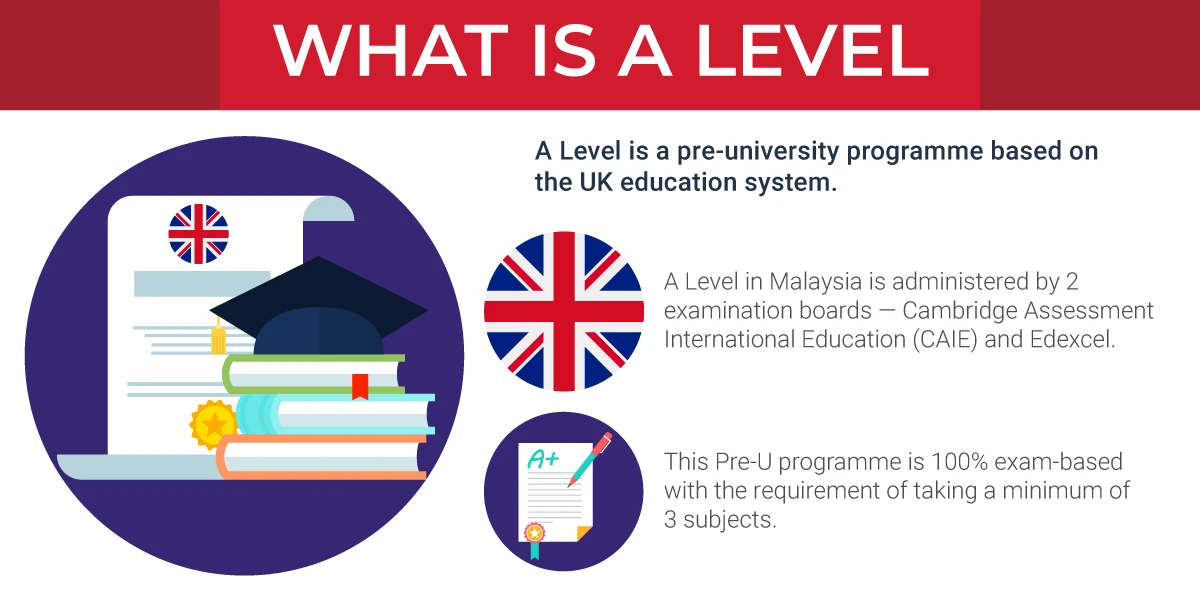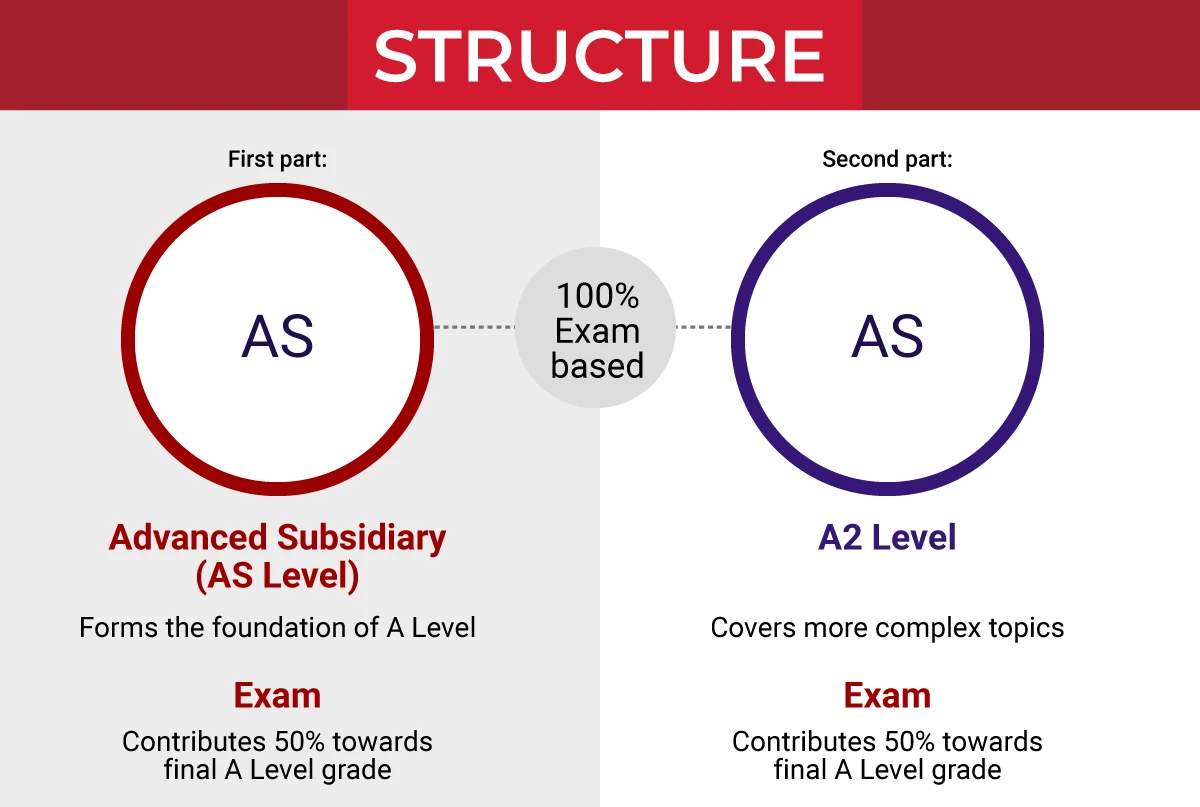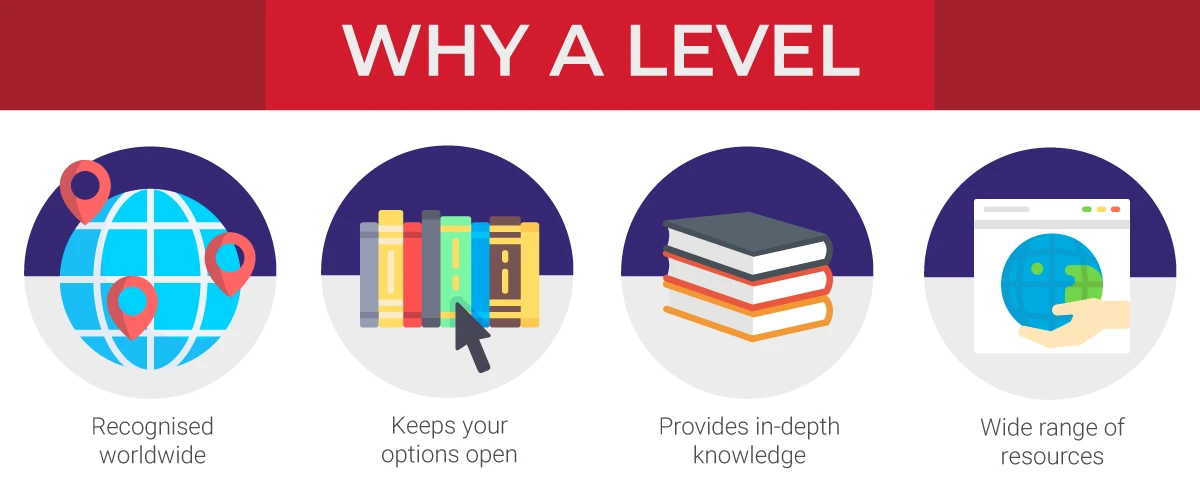The Complete Guide to Studying A Level in Malaysia
What subjects should you take for A Level? Discover degree pathways, recommended subjects and entry requirements to pursue A Level in Malaysia.

If you're wondering what A Level in Malaysia is like, this course guide will explain everything you need to know including what is A Level and how to choose your A Level subjects. That’s not all — we’re also revealing the best A Level colleges in Malaysia to help you narrow down your search.
We want to help you understand all there is to know about this prestigious pre-university programme so that you can make an informed decision about your college education. Let’s get started!
#1. What is A Level?

A Level is a pre-university programme in Malaysia that’s based on the UK education system. You can think of it as the UK’s STPM. Also known as GCE Advanced Level, it prepares you for a university degree through in-depth study of several subjects.
The A Level in Malaysia is administered by 2 examination boards — the Cambridge Assessment International Education (CAIE) and Edexcel. Most colleges in Malaysia offer the A Level from the Cambridge board.
A Level is 100% exam-based, so you’re pretty much reliving your SPM days. But unlike SPM where students usually take 9 subjects, you only need to take a minimum of 2 – 3 subjects.
After studying A Level, you’ll gain in-depth knowledge of your chosen subjects. The independent and logical thinking you were taught throughout your studies will help you present reasoned explanations in an intelligent manner, preparing you for an easier university life.
a) A Level requirements in Malaysia
A level is equivalent to other pre-university programmes such as Australian Matriculation, Canadian Pre-University (CPU) and STPM. Similar to other pre-university courses, A Level in Malaysia requires a minimum of 5Cs at SPM, O-Level or equivalent.
Certain A Level subjects, such as Physics, Chemistry, Biology and Further Mathematics, have subject prerequisites that you need to fulfil. This means you need to have studied and achieved the minimum required grades for the relevant subjects at SPM level in order to take these subjects in A Level.
b) How long is an A Level course?
The A Level duration in Malaysia is 15 – 24 months long, depending on when you start your studies.
c) A Level fees in Malaysia
What’s the cheapest A Level in Malaysia? A Level fees in Malaysia can go from as cheap as RM15,000 to a more elevated fee of RM175,000, depending on the institution you decide to study at.

Taylor's College
Cambridge A Level (Science) (3 Subjects)
✓Excellent track record with more than 3,800 students scoring 3As and above (2012 – 2023)
#2. How is A Level Structured?

Are you wondering what is the difference between A and AS levels?
Well, AS Level is actually a part of A Level. In fact, A Level consists of 2 parts:
- Advanced Subsidiary (or better known as AS Level), and
- A2 Level
AS Level is the first half of the programme and forms the foundation of A Level. A2 Level is the second part of the syllabus, covering more complex topics in your chosen subjects. At the end of each level, you will typically take exams, with each level contributing 50% towards your final grade. In essence, 50% from AS exams and 50% from A2 exams. Remember, A Level is 100% exam-based.
Your final results will be a grade of A* to E for each subject taken. The maximum score is 3A* for 3 subjects and 4A* for 4 subjects.

#3. What Subjects Should You Take for A Level?
When it comes to choosing your A Level subjects, you’ll be spoilt for choice as many colleges in Malaysia offer a variety of subjects to select from. However, some subjects open doors to more degrees and professions than others, so it is important that you choose the right ones.
Which A Level Arts subjects or A Level Science subjects you should choose depends on which degree you plan to study. If you’re not exactly sure what degree you want to study, here are some tips for picking the right combination of subjects.
a) How to choose your A Level subjects?
As a guide, here are some tips on how to choose your A Level subjects:
- Choose subjects that you will likely enjoy – When a particular topic interests you, it becomes less of a chore to study. Also, it’s always easier to excel at something when you enjoy doing it!
- Choose subjects that suit your strengths – Every subject is unique and involves a different skill set. Some subjects require creativity or essay writing, while others may challenge your analytical and critical thinking skills. To do well in this programme, play to your strengths!
- Choose subjects that relate to jobs you’re interested in – Take a personality quiz to help you decide which fields would suit you best.
If you already have an idea of the degree you would like to pursue after A Level, this list of recommended and essential subjects will help you choose your subject combinations.
| Degree | Recommended Subjects |
|---|---|
| Accounting, Business, Economics, Finance | Essential: Mathematics & Economics Recommended: Business Studies, Accounting, Law, Psychology |
| Actuarial Science | Essential: Mathematics Recommended: Further Mathematics, Economics, Physics |
| Biochemistry, Biomedical Science, Nutrition | Essential: Chemistry, Biology & Mathematics Recommended: Physics |
| Computer Science | Essential: Mathematics Recommended: Physics, Further Mathematics, Computing |
| Engineering | Essential: Mathematics & Physics Recommended: Chemistry, Further Mathematics |
| Law | Essential: None Recommended: Mathematics, Economics, Law, English Literature, Accounting |
| Medicine, Dentistry & Pharmacy | Essential: Chemistry, Biology & Mathematics Recommended: Physics |
Still spinning with all these options and unsure what subjects you should study? If you studied Science subjects in SPM and scored good grades, choose Mathematics and Chemistry, and either Biology or Physics. This will keep your options open and allow you to pursue a wide range of degrees upon successful completion of your A Level.
b) How many A Level subjects should you take?
Should you take 3 subjects or 4 subjects? We suggest you take 3 subjects instead of 4 subjects since it’s always better to focus and concentrate on fewer subjects and do well in them. In fact, most universities only require you to take 3 subjects.
However, if you are planning to study abroad and aim to get into top tier universities (especially in the UK), there are times where it may be advantageous to take 4 subjects. This is because some top universities may demand 3A*s. Therefore, some students prefer to take 4 subjects as a “security measure”, just in case they score badly in one of the 3 subjects.
Also, in the case of Engineering, taking A Level Further Maths may be beneficial to you (Further Maths is usually offered as a 4th subject only), since topics in the first year of Engineering Math would have already been covered in Further Maths.

Taylor's College
Cambridge A Level (Science) (3 Subjects)
✓Excellent track record with more than 3,800 students scoring 3As and above (2012 – 2023)
#4. Why Study A Level?

There are many pre-university programmes in Malaysia that you can choose from, but here are some of the top reasons why you should take A Level.
a) A Level is widely recognised by many top universities worldwide
A Level is well-known as the gold standard of pre-university courses and is accepted by many top universities around the world. While it is generally the go-to programme if you wish to study in the UK, it is also accepted by many other countries, including Australia, USA, Canada and Singapore.
b) It keeps your options open
Foundation programmes may limit you to certain degrees at certain universities as the programme prepares you for advanced study in the field you’ve chosen. A Level, on the other hand, allows you to pursue a wide range of degrees upon successful completion. This is especially great if you’re not sure what degree to study yet!
PRO TIP
Choosing Maths and Science subjects will not only allow you to study Science Degrees but also Business, Law, Communication Computer Science Degrees among others.
c) It gives you deep knowledge of your chosen subjects
Instead of having to juggle 5 or 6 subjects such as in other pre-university programmes, A Level allows you to focus on only a few subjects and gain in-depth knowledge in your chosen subjects. This is great for those who are passionate about a few subjects and want to dive straight in.
d) There is a wide range of A Level resources available
The internet is your oyster if you’re an A Level student, as materials such as past year papers, marking schemes and revision questions are readily available everywhere. Your college will also supplement you with sufficient resources to ace your exam.

#5. Should You Take A Level?

If you’re wondering whether you should study A Level, here are some questions to think about:
- Are you academically inclined with an analytical and inquisitive mind?
- Do you prefer a 100% exam-based assessment?
- Are you looking to gain in-depth knowledge in a few subjects, as opposed to studying a wide variety of subjects?
- Are you looking to pursue competitive degrees (e.g. Medicine, Pharmacy, Dentistry)?
- Are you aiming to gain entry into top-tier universities, especially in the UK?
If you answer yes to most of these questions; then, A Level may be right for you.
Remember that A Level is considered one of the more academically and intellectually challenging courses, due to its focus on analysis and application of knowledge.
As such, although most colleges require you to have at least 5Cs at SPM or equivalent. We usually recommend that you have at least 5Bs, with good grades in Maths and English.

Taylor's College
Cambridge A Level (Science) (3 Subjects)
✓Excellent track record with more than 3,800 students scoring 3As and above (2012 – 2023)
#6. Frequently Asked Questions About A Level
a) Is A Level hard?
A Level is generally viewed as a difficult course because it requires you to analyse and apply logical thinking when answering exam questions. You’ll also find that the learning material is more in-depth compared to other courses, such as Australian Matriculation.
However, the level of difficulty depends on which subjects you choose and your time management skills.
Remember how we emphasised the importance of choosing subjects you're interested in and good at? This is crucial to your ability to do well in these subjects. On top of that, you also have to put in the hard work and time to understand your study material.
So if you choose the right subjects and study hard, you'll find that A Level is doable and not as difficult as people say!
b) Is STPM the same as A Level?
The Malaysian pre-university programme STPM is equivalent to various pre-university programmes, including A Level. STPM is also widely recognised globally, especially in universities within the Commonwealth of Nations as well as in the US.
While STPM is just as challenging as A Level, it does have its differences. For example, A Level is 100% exam-based while STPM final grades are based on school-based assessments (20–40% of the final score) plus final exams (60–80% of the final score).
#7. Best A Level Colleges in Malaysia
A Level is generally offered at private colleges and selected MARA colleges in Malaysia.
If you think A Level suits you, then check out some of the best universities for A Level in Malaysia. Alternatively, compare more universities for A Level here.
Taylor's College
Subang Jaya, Selangor
Cambridge A Level (Science) (3 Subjects)
Intake
Feb, Apr, Aug
Tuition Fees
RM33,300
A pioneer in pre-university education









